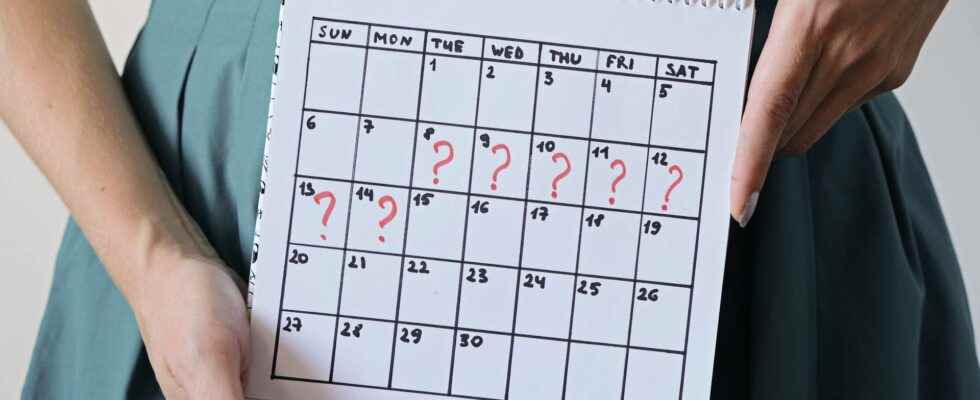Rumors are circulating about the potential adverse effects of anti-Covid vaccines on the menstrual cycle of women. A scientific study has been conducted to explore the issue. It was published this Thursday, January 6 in the review Obstetrics and Gynecology. Decryption.
The study published in the journal Obstetrics and Gynecology is based on the collection of data from a application follow-up menstrual cycle, from October 2020 to September 2021. Four thousand women were included in the trial, aged 18 to 45 years. These women had regular cycles of a duration normal (between 24 and 38 days). Of these, 2,500 were vaccinated with Pfizer-BioNtech, Moderna or Janssen, while the rest were not vaccinated. Women’s cycle length was analyzed for six consecutive months. Regarding the group of vaccinated women, follow-up started three months before vaccination and ended three months after vaccination.
A lengthening of the cycle following vaccination of less than a day
In the group of vaccinated women, the menstrual cycle following the injection was lengthened by less than one day (0.75 days) while the menstrual cycle of unvaccinated women was not lengthened.
A variation in the length of the menstrual cycle of less than eight days is not abnormal
To put this delay in context, it should be noted that the International Federation of Gynecology and Obstetrics considers that a variation in the length of the menstrual cycle of less than eight days is not abnormal. This is because while some women have extremely regular cycles, others can see huge variations from cycle to cycle. In addition, there was no longer any difference between the two groups in the 2e cycle after vaccination. Some women reported delays of more than eight days in both groups, with no significant difference. Women who received two injections in the same cycle (n = 358) experienced an increase in cycle length of nearly two days, an effect that disappeared in the second cycle after the injections.
An already known effect
A minimal and temporary lengthening of the menstrual cycle in women had already been observed after vaccination against the human papillomavirus. As a reminder, this vaccine protects against cervical cancers caused by human papillomaviruses, sexually transmitted. This vaccine is recommended in France for all children (girls and boys) between 11 and 14 years old. A catch-up is possible between 15 and 19 years old. In addition, another study reported that infection with SARS-CoV-2 caused a lengthening of the menstrual cycle in a quarter of infected women.
Others rumors circulate on a possible negative effect of vaccines on female fertility. The data available to date show no impact of vaccination on fertility in either women or men.
In contrast, infection with Covid-19 in a pregnant woman increases the risk of miscarriage or premature birth. In conclusion, if you are a woman who wants to have a baby, know that the vaccine has no impact on your fertility. On the other hand, being infected with SARS-CoV-2 during pregnancy may interfere with the smooth running of it.
Do Covid Vaccines Really Affect Fertility and Periods?
Vaccines can cause sterility and affect menstruation. These statements are regularly shared on social networks. What does the scientific community say?
Article by Julie kern, published on August 27, 2021
These are rumors that are tough. They spread on social networks or during discussions with family or friends. Covid vaccines would make women infertile and disrupt periods.
What is the scientific community’s response to these concerns which may deter women of childbearing age, in particular? the youngest, to get vaccinated?
Do Vaccines Make Women Infertile?
The theory that vaccination or infection with SARS-CoV-2 could cause infertility is based on the presumed similarity between the protein SARS-CoV-2 S and syncytin-1. Syncytin-1 is encoded by a retrovirus human endogenous (HERV), a uncomfortable inherited from a retrovirus that settled and stabilized in the genome of our ancestors millions of years ago. This protein plays a fundamental role in the formation of the placenta.
Thus, some believe that antibody specific S proteins, whether related to natural infection or vaccination, can also recognize syncytin-1 and destroy it. If this cross neutralization is verified, it would cause sterility.
However, as indicated this study published on June 2, 2021, this theory could not be proven by rigorous scientific experiments. No alteration of the implantation of theembryo at the house of pregnant women vaccinated or infected with Covid-19 was observed, in comparison with HIV-negative women.
‘British women have made 30,304 reports of changes to their periods after having received a Covid vaccine. I am one of them. ‘
✍️ Lara Prendergasthttps://t.co/I9EmDq6Q3B
– The Spectator (@spectator) August 19, 2021
Do vaccines disrupt the menstrual cycle?
A second rumor spread from real and valid testimony. On Twitter, many women have reported problems with their periods after vaccination: longer or shorter, heavier or lighter, more painful or suddenly irregular.
These experiences do not seem to be a consequence of vaccination. Other factors can explain these very common variations, and most of the time transient. The first is undoubtedly the stress linked to vaccination. But there is also fatigue or a change in lifestyle.
In a report published in early August, the Pharmacovigilance Risk Assessment Committee, a committee in charge of pharmacovigilance issues for the European Medicines Agency, has found no causal link between anti-Covid vaccines and menstrual disturbances, reported by many women.
Nevertheless, they are to be watched. If menstruation problems persist over time or worsen, they may be synonymous with a more serious disease such as endometriosis or the formation of uterine fibroids.
These two rumors are therefore not based on verified scientific data, like many medical publications that go viral on social networks.
—
Discover Covipod, the podcast dedicated to coronavirus news
Every two weeks, join Julie kern, health journalist with a master’s degree in infectious disease, for an overview of the latest news and the measures adopted to counter the pandemic.
—
Interested in what you just read?
.
fs6
